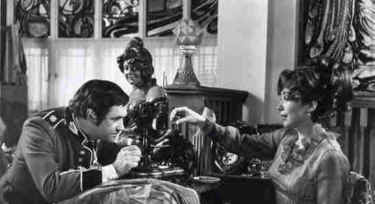

The Bliss of Mrs. Blossom (1968)
This is a silly, sweet farce about polyamory, based on a true story. Mrs.
Blossom (Shirley MacLaine) is the bored wife of a brassier magnate (Richard
Attenborough). Ambrose
Tuttle (James Booth) is
the factory
mechanic who shows up to fix her sewing machine and then hangs around in her attic for the next four years as her secret live-in lover. His
disappearance is investigated by detectives, who fail to recognize him under various
disguises. Meanwhile, the arrangement benefits all three members of
the triad. The housewife finds sexual fulfillment. The underachieving lover becomes a paragon of accomplishment and
responsibility, whose investment tips make the husband rich. And the
cuckolded businessman ends by rediscovering the joys of domesticity and turning
the tables on Tuttle in a most ironic way. The costumes, interiors, and soundtrack evoke a strong period atmosphere of Swinging London.
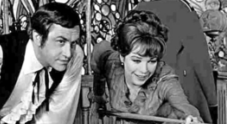
It's a cute story, and everyone involved does a workmanlike job. But try as I will to love this film, I find it ultimately unsatisfying, especially in its misuse of James Booth.
The makers of Bliss are pretty sure you've seen and loved Zulu, so to capitalize on that they briefly dress Tuttle in a red tunic like the one Booth wore for his most famous role. It's not a bad gimmick. (What bored, lonely woman wouldn't be overjoyed to find a hottie like Hookie at the door, ready to rescue her with "a new spindle"?) But the device backfires because everything's all wrong. Tuttle doesn't act like Hookie: he isn't dangerous or funny or sexy and he doesn't move like a big cat. The tunic is in perfect condition, not dirty or torn, and, worse yet, it is worn with no suspenders ( braces, to readers from the UK), no open-fronted shirt, and no neck scarf. Booth looks as if teams of cosmeticians have spent hours pomading his hair, powdering his nose, trimming his sideburns, and generally trying to undo his ruggedness and make him pretty. (Why???) Ambrose Tuttle is an eccentric but harmless freeloader who seduces Mrs. Blossom by appealing to her maternal instincts.
Having promised us Hookie but delivered only a bizarre flavor of James Booth Lite, Bliss goes on to present Tuttle in a whole host of ludicrous and unflattering costumes. I can't decide which I hate more: the too-small lavender pajamas worn with black dress socks or the Mexican bandit outfit.
There's another problem. The role of Ambrose Tuttle seems to have been written for a very young actor: Tuttle is even called a "teenager" at one point. Booth can pass for a youth in some distant shots, but viewed closer up he's obviously pushing forty (and not at his best). Since Booth looks older than MacLaine, the whole drift of his seduction speech becomes unintentionally insulting. (She would be thinking: "I remind you of your MOTHER!? How old do you think I am?") Booth's maturity also makes Tuttle generally less sympathetic than the film intends, since aimlessness and dependency of such proportions are more forgivable in a kid than in a grown man.
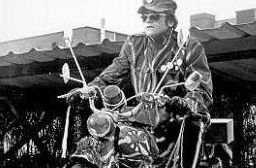
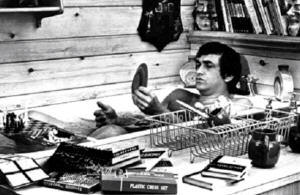
Then there's the film's treatment of its sexual content. The fantasy vignettes seem designed to show us that the affair in the attic is wildly experimental, full of dress-up and role-playing and make-believe. But Booth and MacLaine have zero chemistry. The lovers' kisses and embraces are as chaste and wooden as their ongoing habit of addressing each other formally ("Mrs. Blossom," "Mr. Tuttle").
Some commentators have praised this approach for its inoffensiveness and good taste. And there's no doubt that Bliss is inoffensive and tasteful--so much so that an American high school teacher gets away with showing the film to her classes (to give them a sense of the sixties). But come on: making a G-rated sex farce is a silly idea. It's also, in this case, a waste--of the story and of James Booth. I am haunted by the sense of some other, racier movie that could have been made from this material.
But Bliss has a few moments that I love. There's the scene where Tuttle, on his back beneath the sewing machine, "accidentally" puts his hand up Mrs. Blossom's dress. There's that lovely moment when an exhausted and inebriated Tuttle collapses onto his bed in his gothic revival bedroom, looking for all the world like a Beardsley drawing of Oscar Wilde. And there's the delightful bit soon afterward, where he crawls around under some dropcloths, looking for a ringing telephone. Mild though it may be, there is also a sweet, innocently pansexual scene toward the end of the film. When Blossom celebrates his success by throwing a lavish party, Tuttle attends disguised as a gay ad man. He hangs on Blossom’s every word and flirts with him incessantly. When the party’s over he gets into bed beside Blossom. Everyone’s fully clothed and nothing happens.
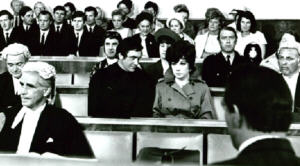

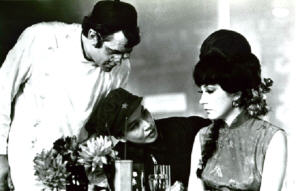
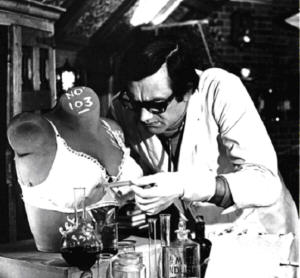

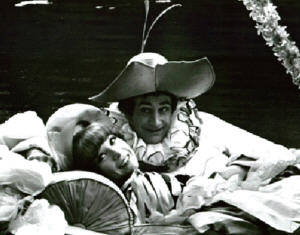
Bibliography
Sheet Music, I Think I'm Beginning to Fall in Love
Deviant Desires: Incredibly Strange Sex by Katharine Gates, Juno Books, 2000, New York, NY
This fascinating book about unusual sexual orientations explains that The Bliss of Mrs. Blossom has a cult following among "body expansion" fetishists (who want body parts to inflate as if they were balloons). The film was named number four in the Top Thirteen Media Moments for Body Expansion Fans, based on a scene near the end of the film, where inflatable bras get out of control. Body expansion fetishism and its connection to The Bliss of Mrs. Blossom are discussed in the chapter, "Body Inflation: To Dream the Impossible Dream," pp. 94-105.
At Home...with the Blossoms, ABC Film Review, 11/67
Monthly Film Bulletin, January 1969
ABC Film Review, November, 1968, The Bliss of Mistress Blossom
ABC Film Review, November, 1968, The Bliss of Mistress Blossom
ABC Film Review, December, 1968, The Bliss of Mrs. Blossom
ABC Film Review, November, 1968, The Bliss of Mistress Blossom
Australian Movie News
Magazine, February 1969
Text copyright Diana Blackwell, 2002.